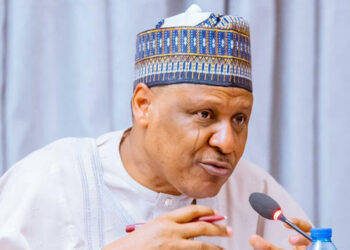For any one who has paid more than a passing attention to the activities of the Federal Inland Revenue Service (FIRS) in the last four years, the agency’s tax collection receipt in the first six months of 2023 would certainly not be surprising.This is because the FIRS under the leadership of Muhammad Nami has been constant in scaling new heights.
But even at that, a N5.5 trillion total tax revenue collection between January and June this year is not a mean feat especially as this was more than the N4.95trillion the FIRS collected in the entire 2020 fiscal year and about nine hundred billion naira less than the N6.4 trillion collected in all of 2021.
It is the highest ever tax collection by the service for the first six months of a fiscal year. But undeterred, the tax agency is convinced that it would better that number in the last six months of 2023.
In the words of the FIRS Executive Chairman on the day he made the record- breaking announcement at the meeting of National Economic Council (NEC) a few days ago, there are “better days ahead”.
And this he attributed to “continuing improvement to our tax processes and positive impact of current government’s policies on the economy”.A breakdown of the 2023 half year tax collection figure shows that while non-oil taxes continued to do well with N3.76 trillion, oil taxes stood at N1.73 trillion.
And listening to Muhammad Nami on the day, it would be difficult for anyone to bet against the agency exceeding that feat at the end of the fiscal year.
This is because it collected a total of N1.65 trillion tax revenues in June 2023 alone, the highest tax receipt by the agency in a single month.Success ForetoldA cursory look at FIRS trajectory since at least 2020 when the Muhammad Nami-led management assumed office shows that signs of a successful tax collection regime were there from the onset. This is inspite of the grim shadow of COVID-19 on the polity which was bound to have negative consequences on the economy.In the year the pandemic held the world in its grips, the agency’s tax receipt fell slightly short of its N5.07 trillion target when it raked in N4.95 trillion inspite of a global slump in crude oil prices and disruption to businesses.
One could easily recall how the FIRS Executive Chairman explained that the global oil slump impacted negatively on tax returns through the Petroleum Profits Tax which accounted for only 30.6% of the tax revenue generated in 2020, compared to previous years.So the country had to rely more on non-oil taxes which rose astronomically as a result of the deployment of a tax reform built on a 4-pronged approach which includes: rebuilding FIRS’ institutional framework, improving collaboration with stakeholders, making the agency a customer-centric institution and finally to turn it into a data-centric institution.
And with COVID-19 not fully a thing of the past, the tax reforms began to manifest in 2021 with increased stakeholder collaboration and the deployment of technology. It was the year of Tax Pro-Max so not surprisingly, FIRS overshoot its N6.401trillion target for that year.In a personally signed performance update for the 2021 fiscal year,the FIRS helmsman said the agency collected a total of N6.405 trillion in both oil (N2.008 trillion) and non-oil (N4.396 trillion) revenues as against a target of N6.401 trillion.
A further breakdown shows that Companies Income Tax amounted to N1.896 trillion; Petroleum Profits Tax brought in N2 trillion; Value Added Tax raked in N2.07 trillion; Electronic Money Transfer Levy topped N114 billion while Earmarked Taxes recorded N208.8 billion; among others. What this meant was that the non-oil sector contributed 68.64% of the total collection in 2021, while the oil sector’s contribution was 31.36% of total collection.
But in 2022, the oil sector did better as FIRS broke the N10 trillion mark by contributing 41% of the total tax collection for the fiscal year with an unprecedented figure of N4.09 trillion to N5.96 trillion from the non-oil sector according to the year’s performance update report.All of these can be attributed to a quantum leap in stakeholder engagements under the watch of the current FIRS leadership, an automated system with Tax Pro-Max as the guiding light for tax administration as well as training and retraining of FIRS staff to improve their capacity.
So it is quite easy to trace the performance index of FIRS from 2020 and come to the conclusion that its 2023 half year collection of N5.5 trillion was not entirely surprising. It is indeed a story of success foretold right from inception, not only because of the ongoing tax reforms but also because of improved stakeholder collaboration. And indications are that things can only get better.
Dapo Okubanjo is a journalist/public affairs analyst based in Abuja. He can be reached on dokubanjo@yahoo.co.uk
No schema found.









